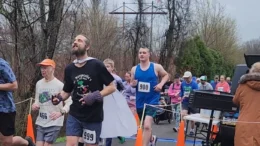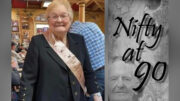MILFORD (AP) — The news came at 4:37 p.m. Wednesday, April 19, 2017. The jury had reached a verdict.
Minutes later, sheriff’s deputies escorted Eric Matthew Frein into the courtroom. His blank expression didn’t change as the jury declared him guilty on all counts. The mother and widow of the man he killed gripped hands. Frein’s mother looked down.
After deliberating for about four hours, the 12 Chester County jurors found Frein, 33, of Canadensis, guilty on all 12 charges in his capital murder case — first-degree murder; first-degree murder of a law enforcement officer; attempted first-degree murder; attempted first-degree murder of a law enforcement officer; assault of a law enforcement officer; two counts each of terrorism and possession of weapons of mass destruction; and one count each of recklessly endangering another person, discharge of a firearm into an occupied structure and possession of an instrument of crime.
“Let’s say I was not surprised,” said Frein’s attorney, William Ruzzo, after the jury reached their verdict.
Frein hid in the forest across the street from the Blooming Grove state police barracks on the night of Sept. 12, 2014, and fired four shots. Two hit and killed Cpl. Bryon K. Dickson II, 38, of Dunmore while a third severely wounded Trooper Alex T. Douglass, 34, of Olyphant. The fourth hit a tree.
“A terrorist with murder in his heart, a plan in his mind and a rifle in his hands slithered though the woods … and he waited,” District Attorney Ray Tonkin said during his nearly two-hour long closing statement Wednesday. “That murdering terrorist, ladies and gentlemen, sits before you. He sits right over there.”
Tonkin’s statement summed up the vast trove of physical and forensic evidence collected from the shooting and subsequent 48-day manhunt.
Jurors again saw the surveillance footage of the shooting collected from the barracks. The images of murder were overlaid with excerpts from a journal prosecutors said Frein wrote, providing details only the shooter could know, Tonkin said.
The shooting only lasted 90 seconds, but amid the fear and confusion, it felt like a “lifetime,” the prosecutor said.
“They really couldn’t figure out what was going on because who could figure out what was going on so quickly …” Tonkin said. “This is not planned, this is unexpected. That’s where terrorism strikes.”
Defense attorney Michael Weinstein’s approximately 10-minute closing statement mirrored large parts of the equally short opening statement he gave more than two weeks ago. The attack at the Blooming Grove barracks was a tragedy for the county, the state police and both families affected, he said.
Tiffany Dickson, the slain trooper’s widow, sat on the right side of the courtroom, surrounded by the trooper’s family and rows of law enforcement officers in suits and ties.
Eugene and Deborah Frein sat on the left side of the room, near two dozen or so members of the public.
Their son’s eyes seemed to linger on the empty jury box when sheriff’s deputies led him from the room after the closing statements. After Judge Gregory H. Chelak instructed the jury on the law, they retired to deliberate at 12:48 p.m.
After nearly four hours, a pizza lunch and one cigarette break for two jurors, the eight women and four men found Frein guilty on all counts. They asked no questions of the judge during deliberations.
With a first-degree murder conviction in hand, the trial to decide if Frein should be put to death or spend the rest of his life behind bars begins today.
Frein’s defense attorneys, Ruzzo and Michael Weinstein, will present evidence and testimony beginning at 1:30 p.m. to try to spare Frein’s life.
“We would like to present Eric in the most sympathetic light that we can,” Ruzzo said. “They villainized him. We can’t make him a holy man but we can try to make him a man.”
Though Ruzzo stopped short of discussing specific mitigating evidence he will present, he said it can generally focus on a defendant’s past, education and family. Court filings show they hired two expert witnesses: Carol Armstrong, a neuropsychologist, and Louise Luck, who specializes in developing mitigating evidence for death penalty cases. Some members of Frein’s family also are expected to testify.
Frein’s parents declined to comment as they left the courthouse and stepped into the rain. Deborah Frein pulled her raincoat over her head and yanked the cover over the lens of a television camera as she walked to Weinstein’s office.
The two veteran attorneys did not present evidence or testimony during the guilt phase and sparingly cross-examined prosecution witnesses.
After the defense makes its case, Tonkin and his office will argue that Frein’s crimes deserve death because Dickson was a law enforcement officer murdered in the course of his duties and Frein put others at risk by firing into the barracks. Tonkin is seeking the death penalty, despite a moratorium on executions in Pennsylvania. Tonkin said he will ask the jurors to give the “appropriate sentence.”
“Today justice was served and a brutal murderer will be held accountable for his heinous and cowardly acts against members of the Pennsylvania State Police,” Gov. Tom Wolf said in a statement shortly after the verdict.
Chelak told jurors before he dismissed them that they aim to wrap up the case by the end of next week.
“This case is not yet over,” Tonkin said. “We have a very serious and somber proceeding to go through and I hope that the businesses here in the Poconos and all the residents take some solace that justice has been done on this date and we will be looking for full justice next week.”







































